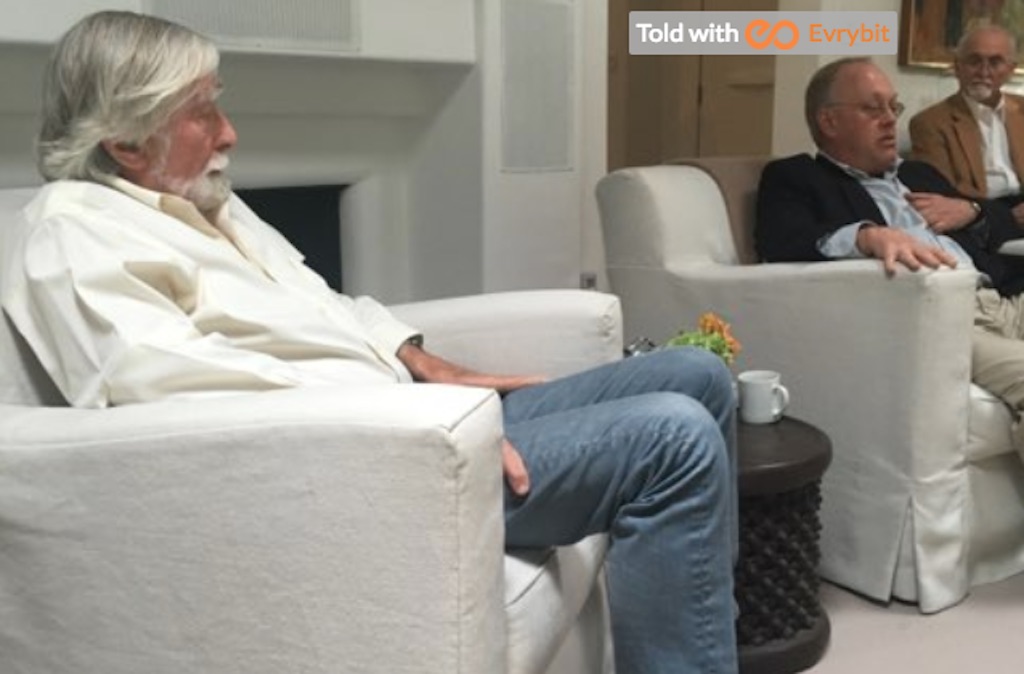Chris Hedges and Robert Scheer on War, Religion and Fighting American Neoliberalism
The Truthdig editor in chief sat down with the acclaimed journalist for an intimate conversation about their careers and the American political landscape. Robert Scheer, left, and Chris Hedges, center.
Robert Scheer, left, and Chris Hedges, center.
A handful of people gathered Monday at a private Los Angeles residence for an old-school salon to discuss contemporary politics with two great thinkers: Truthdig Editor in Chief Robert Scheer and acclaimed journalist and Truthdig contributor Chris Hedges.
Scheer opened the conversation by delving into war, the topic Hedges has spent much of his life covering. “In terms of my own journalistic career, the turning point was the Vietnam War,” Scheer said. As a journalist, he said, “My experience with war was sporadic. I could always leave,” although he noted that “the wounds don’t go away.” Then Scheer turned the conversation to Hedges’ “graduate education in war.”
Hedges told how he studied politics as a teenager before moving to South America to become a war correspondent. His most formative life experience wasn’t living in a fascist country—it was growing up in Roxbury, a neighborhood in Boston that, he explained, introduced him to institutional racism. “You can’t understand America if you don’t understand white supremacy,” Hedges said.
His time as a foreign correspondent left its mark, however. One of his first journalistic stints was in El Salvador, where he spent half a decade. “When you spend five years covering a war, it messes you up,” he said. “There were journalists who stayed longer than five years, but none of them were alive.”
Hedges spent decades reporting in various war-torn countries, and he developed a nervous tic and post-traumatic stress disorder as a result of living in constantly stressful environments. “The sickness of war had become my own sickness,” he said. Finally, he became a foreign correspondent for The New York Times, where he broke numerous stories over the years. Ultimately, he was let go from the Times after a commencement speech he gave garnered extreme criticism. Although he felt anxious about losing his job, Hedges realized that he “didn’t need The New York Times to tell me who I was.”
Hedges ventured into the broader topics of truth-telling and journalistic ethics. “Truth and news are not the same thing,” he said.
Scheer then steered the conversation to religion, and Hedges described what he sees as a form of the afterlife: He uses his voice for his late father’s words. “That, to me, is resurrection.”
“Without religion, we don’t have a ready weapon of accountability,” Scheer added. “Right now, what we teach in these universities is that careerism trumps everything.”
Hedges noted that many aspects of modern religion are problematic. “I think the Christian right is [composed of] heretics. I don’t think they’re Christians,” he said. “Jesus was a pacifist … [but] in the name of tolerance, [most Christians don’t] fight the battle they should fight.”
Hedges talked about teaching college courses in prisons. In one class, he led a handful of male prisoners in a play-writing workshop, which culminated in the creation of a play titled “Caged,” which Hedges is trying to bring to the stage in New York City.
The conversation broadened. “How do we stay compassionate in the face of constant global tragedy?” someone in the room asked. Hedges replied that he tries to maintain a constant relationship with the oppressed; this, he believes, keeps him accountable, despite his own privilege as a white male American.
The discussion turned to the current election. Hedges said we are watching the rise of fascism through neoliberalism in America. Trump is “imbecilic, idiotic, self-destructive, morally repugnant,” he said, and it says something about our country that Hillary Clinton “is only four points ahead” in the polls. Clinton, he said, “is basically Mitt Romney in drag.”
So how does the average American combat neoliberalism, if our current political process is such a shambles? For Hedges, it comes down to large-scale movements—such as the boycott, divestment and sanctions movement, the Dakota Access pipeline protests and social justice movements that originated in Ferguson, Mo. “We can’t underestimate the power of living in truth,” Hedges said, “even though it’s outside of the formal mechanisms of power.”
These movements have the power to influence the political elite, he continued. “The only things they have to offer you in this election is fear,” Hedges concluded. “The moment you stop being afraid, they become afraid.”
An audio version of the full conversation will soon become available on KPFK. Various moments of the salon were captured using Evrybit—check out the multimedia story below:
Your support matters…Independent journalism is under threat and overshadowed by heavily funded mainstream media.
You can help level the playing field. Become a member.
Your tax-deductible contribution keeps us digging beneath the headlines to give you thought-provoking, investigative reporting and analysis that unearths what's really happening- without compromise.
Give today to support our courageous, independent journalists.









You need to be a supporter to comment.
There are currently no responses to this article.
Be the first to respond.